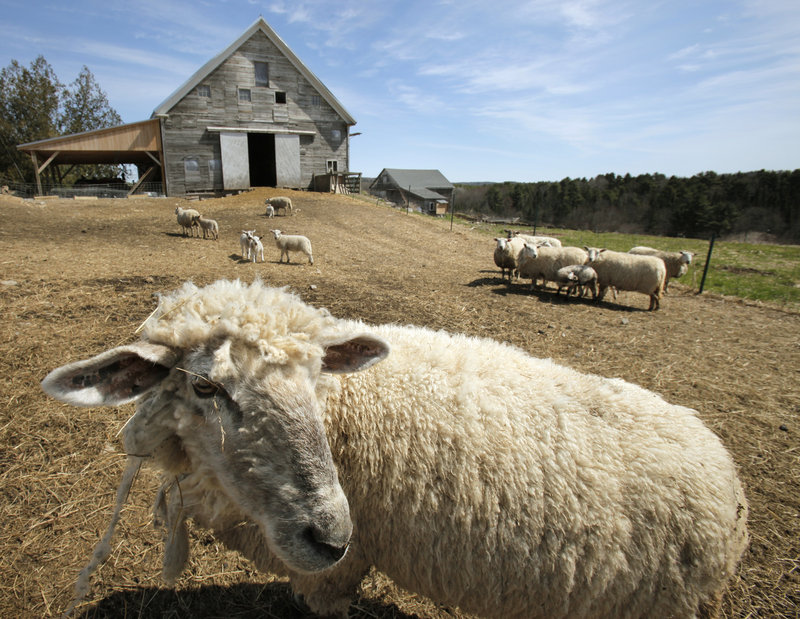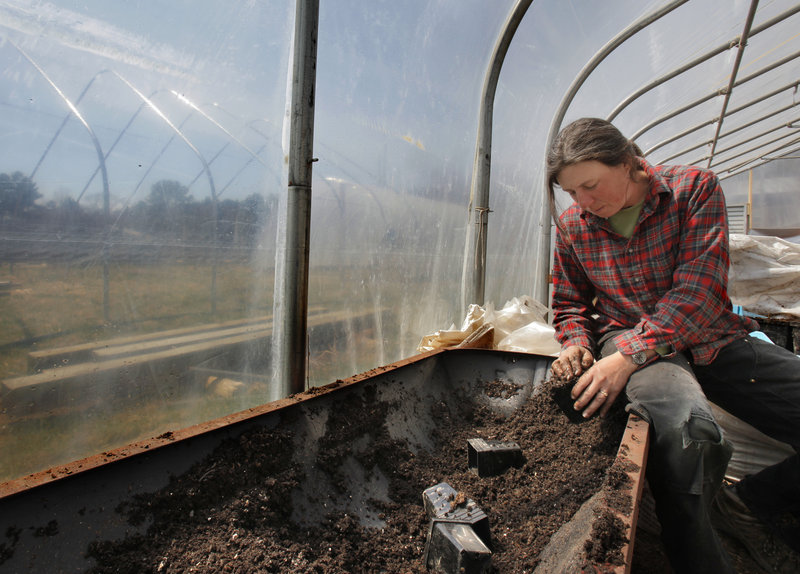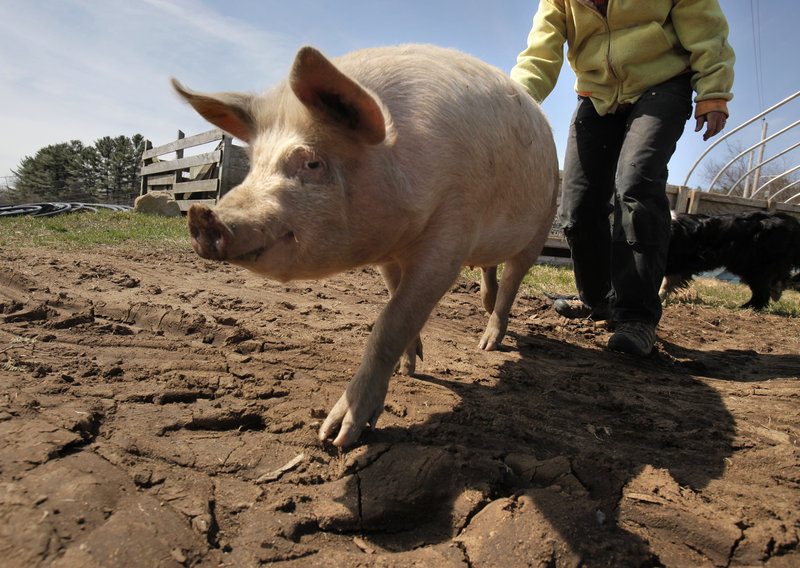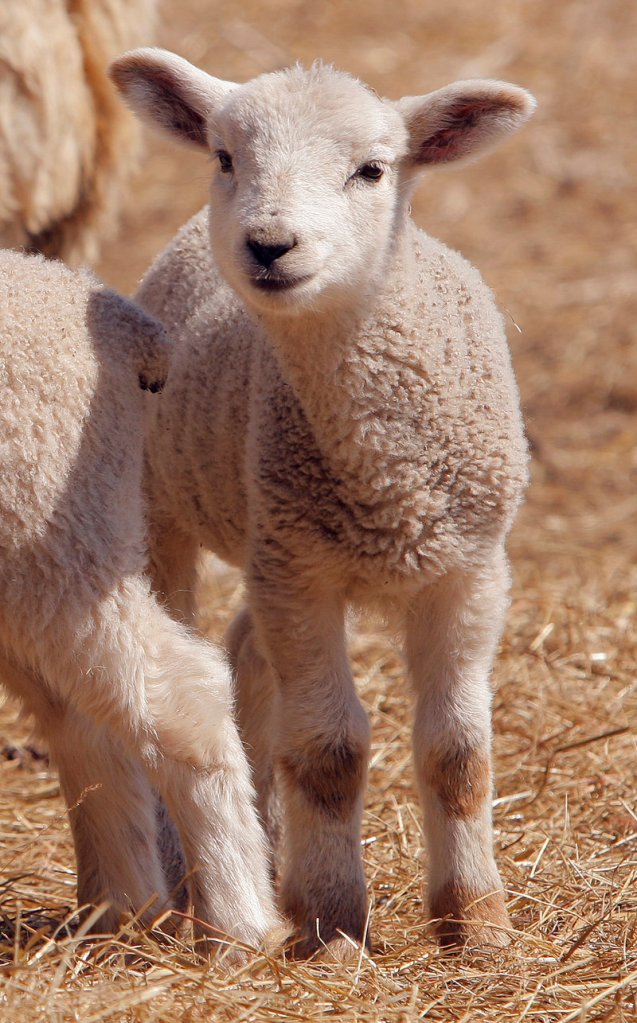Beth Schiller says she has to make an appointment more than a year ahead to get a slaughter date for the pigs she raises at Dandelion Spring Farm in Newcastle.
Schiller, who sells the meat at farmers markets and to Portland restaurants, said the lack of licensed processing facilities is one of the hurdles she faces as a small farmer in Maine.
“It is getting more and more difficult for people to raise their own food,” said Schiller, who also raises sheep and grows vegetables on about five acres.
She is among an increasing number of growers who say federal and state food safety regulations are not working for small farmers in Maine.
Several communities on the Blue Hill Peninsula have passed or are considering ordinances this town meeting season seeking to exempt local farmers and food producers from state and federal regulations.
Sedgwick, Blue Hill and Penobscot adopted local laws that say state and federal regulations do not apply in their towns if farmers and other food producers sell directly to their customers. Trenton voters will take up a similar ordinance next month, and comparable measures are also being considered in Monroe and Mount Vernon. At the same time, several bills aimed at easing regulations for small farmers are working their way through the Legislature.
A group of farmers in and around Brooksville drafted the local laws. Brooksville was home to the late Helen and Scott Nearing, who were influential forces in the back-to-the-land movement. Ironically, Brooksville is the only town on the Blue Hill Peninsula where voters rejected such an ordinance.
The farmers say state and federal food safety regulations are designed for large-scale agribusinesses and make no sense for the state’s burgeoning numbers of small-scale farmers. Rather than wait for change at the state and federal level, they came up with their own model for deregulation at the local level, the Local Food and Community Self-governance Ordinance.
“We have been frustrated by the lack of understanding about what we are doing,” said Bob St. Peter of Sedgwick, a community organizer and one of the drafters.
The ordinances, which may be the first of their kind in the country, have caught the attention of federal regulators, as well as attracting national notice in food and agricultural circles.
They have also divided Maine’s agricultural community. The Maine Cheese Guild has come out against deregulation, while the Maine Organic Farmers and Gardeners Association has remained neutral.
“There is quite a variation of opinion,” said Maine Agriculture Commissioner Walter Whitcomb.
Mark Lapping, a professor who studies Maine agricultural policy at the Muskie School of Public Service at the University of Southern Maine, called the issue complicated and nuanced.
“A number of communities are passing these ordinances because they want to support and even nurture agriculture. On the other hand, states say their hands are tied because these regulations come down from the feds,” said Lapping.
Lapping said part of the problem in Maine is that, along with its farms, the state has lost much of its food processing infrastructure, such as slaughterhouses and cold-storage facilities.
“All of this is coming to a head as more people in Maine and across the country are really getting very interested in a revival of local agriculture,” he said.
Russell Libby, executive director of the Maine Organic Farmers and Gardeners Association, said the challenge is ensuring food safety but allowing innovation by farmers and food producers, such as Stonewall Kitchen in York, which got its start at farmers markets.
Advocates of the ordinances say current laws are holding them back from meeting the rising demand for locally grown and produced food. They say small farmers can’t afford to comply with food safety rules that require them to build expensive facilities for slaughtering their chickens or commercial kitchens for making cookies, jams and other food products. They say the big food-borne disease outbreaks have involved large-scale agribusinesses.
They argue that small-scale farming is naturally self-policing when it comes to food safety. Local farms that fail to ensure the quality of their food won’t stay in business.
“I know what food safety means to me. It means that I know the hands that feed me: the hands of my neighbors, the hands of other farmers in my grange, my own hands,” said Deborah Evans, a Brooksville farmer who helped draw up the model ordinance.
But critics say deregulation advocates have exaggerated the costs of complying with food safety laws. They say they welcome regulation to ensure the quality of their food.
“This is about a commercial level of food processing, not about Grandma who can’t sell her jelly without being regulated,” said Eric Rector, owner of Monroe Cheese Studio in Monroe and president of the cheese guild.
Rector said he manages to comply with Maine’s regulations even though he is a small-scale producer who makes about 10 pounds of blue, Gouda and feta-style cheeses a week to sell at the Belfast Farmers Market.
He said it costs him $25 a year for a cheese maker’s license, which covers the cost of having his water tested annually and a yearly inspection by a state dairy inspector. He said the inspector operates more like a partner than an enforcer to help ensure the cheese being produced is of the highest quality.
Rector said it cost him $150 to set up his cheese-making facility, mostly for stainless steel pots, in a room in his barn. He said nobody knows how many food-borne illnesses are caused by small farmers operating outside the regulatory process.
“To me, these are people who don’t want to bother,” he said. “They seem to be making a political statement, and politics shouldn’t be involved in how we make food safe.”
The local ordinances are creating headaches for state agricultural officials who say they are trying to protect Maine food producers from more federal oversight. Whitcomb, the agriculture chief, said federal officials are closely monitoring events in Maine.
“This is serious. They are asking our inspection officials, ‘What are you going to do about it?’ If they are not satisfied, they will take over,” said Whitcomb.
He asked the Maine Attorney General’s Office to draw up a letter, which has been sent to all three communities with ordinances, informing them state law pre-empts the ordinances.
“Persons who fail to comply will be subject to enforcement, including the removal from sale of products from unlicensed sources and/or the imposition of fines,” the letter states.
The Legislature has given a chilly response to several bills aimed at deregulating small farmers this session. A measure that would have eased rules governing the sale of raw milk died before the Agriculture, Conservation and Forestry Committee. A bill that would allow people to sell food prepared in their homes directly to customers appears headed for a similar fate.
That has not deterred farmers like Evans, who said she will continue to sell her “criminal caramels,” which she makes in an unlicensed kitchen from lard rendered from her pigs, which are slaughtered in a licensed facility.
“This is about our right to choose,” said Evans.
Staff Writer Beth Quimby can be contacted at 791-6363 or at:
bquimby@pressherald.com
Send questions/comments to the editors.







Success. Please wait for the page to reload. If the page does not reload within 5 seconds, please refresh the page.
Enter your email and password to access comments.
Hi, to comment on stories you must . This profile is in addition to your subscription and website login.
Already have a commenting profile? .
Invalid username/password.
Please check your email to confirm and complete your registration.
Only subscribers are eligible to post comments. Please subscribe or login first for digital access. Here’s why.
Use the form below to reset your password. When you've submitted your account email, we will send an email with a reset code.